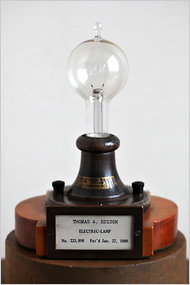The House is expected to vote as early as Monday night on a measure to repeal efficiency standards for light bulbs that are scheduled to take effect at the beginning of next year.

Bloomberg NewsPledge of allegiance: Thomas Edison's original incandescent bulb.
5:55 p.m. | Updated The vote is now anticipated on Tuesday.
The Republican-sponsored repeal bill, H.R. 2417, would undo part of a 2007 energy bill that passed with broad Republican support and was signed into law by former President George W. Bush.
The primary author of the light bulb provision in the 2007 law was Representative Fred Upton, Republican of Michigan, now the chairman of the Energy and Commerce committee and the scourge of the Environmental Protection Agency.
Mr. Upton reversed his position on light bulb efficiency late last year while campaigning for the chairmanship of the powerful Energy and Commerce committee. The bulb standard, which does not ban incandescent bulbs but requires them to be more energy-efficient, was opposed by Rush Limbaugh, Glenn Beck and other conservatives as an assault on personal choice.
Mr. Upton said that his support for the original measure had been misinterpreted.
"It was never my goal for Washington to decide what type of light bulbs Americans should use," he said in a statement. "The public response on this issue is a clear signal that markets — not governments — should be driving technological advancements. I will join my colleagues to vote yes on a bill to protect consumer choice and guard against federal overreach."
The sponsor of the measure to repeal the bulb law, Representative Joe Barton, Republican of Texas, argues that the new incandescent bulbs, as well as compact fluorescent bulbs and light-emitting diodes, will be far more expensive than traditional bulbs.
"We don't think the federal government should tell people what kind of lighting to use in their homes," he said on Fox News last month.
The repeal measure will be brought up under a House rule that requires a two-thirds vote for passage, and it is far from clear that enough Democrats will join a near-unanimous Republican caucus to ensure its passage. But even if the House approves the measure, its prospects in the Democratic-run Senate are dim.
Steven Chu, the secretary of energy, said that consumer choice would be preserved and households would see considerable savings in their electric bills when the new bulbs are fully in use.
"These standards do not ban incandescent bulbs," Mr. Chu said in a conference call with reporters on Friday. He said the new bulbs look like current bulbs, turn on instantly and can be used with dimmers, unlike some compact fluorescents.
"The only difference is they will help American consumers save more money," he said.
The Natural Resources Defense Council, an environmental advocacy group, said that the average American family's energy costs would be reduced by 7 percent, or about $85 a year, when the new light bulb standards are fully in place.
In a study released last week, the group said that replacing inefficient old bulbs with new units would eliminate the need for 33 large power plants, lowering electricity costs and harmful pollution.
"Clearly, consumers, the economy and the environment will suffer if these standards are repealed," said Jim Presswood, the group's federal energy director. "It also will send the wrong signal to the lighting industry, which has already started making better bulbs."
One manufacturer of LED lighting systems vigorously defended the new bulb standards, saying they would help create jobs, lower electricity costs and keep the United States competitive with other nations.
"Improvements in energy efficiency can reduce the need for investment in energy infrastructure, cut fuel costs, increase competitiveness, improve consumer welfare and significantly reduce greenhouse gas emissions," said Jim Haworth, chief executive of Lighting Science Group, a Florida based manufacturer.
"Lighting is the low-hanging fruit in reducing energy consumption: it accounts for 19 percent of the world's energy use," he added. "There are 4.4 billion traditional light sockets in the United States alone, offering a rapid and practical path for billions of dollars in energy savings through the installation of more efficient lighting."





